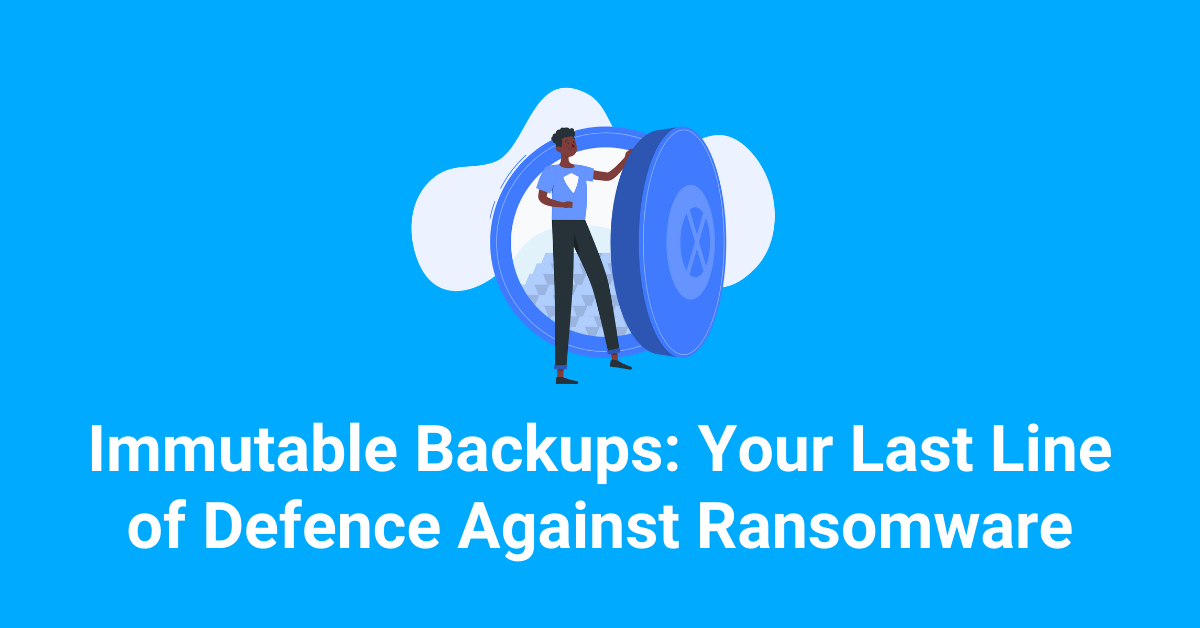Immutable Backups: Your Last Defence Against Ransomware
We carry back-up chargers for our mobile devices. We make second sets of keys for our homes and offices. We make sure there is a spare tyre in our vehicles. Yet, what happens when your back-up charger is dead, your copied key doesn’t work in the lock, or you open the boot to find your tyre is damaged?
The same preparation applies to the way we conduct business today. Regular data backups are a normal—and increasingly critical—part of doing business. Imagine one of your systems is down because of a cyberattack or adverse event. In most cases, while it's a significant pain, you can recover and reboot your system because your data is backed up and accessible. Having a copy of your data allows you to recover from data loss caused by hardware or software failures, malicious cyberattacks, and accidental data deletion.
However, just as with a flat spare tyre in your vehicle, what happens if your data backup has also been compromised?
Today, sophisticated malware finds ways to target even backed-up data. The recent Prometheus ransomware, for example, has been found to encrypt or kill backup files once it infiltrates a system, affecting businesses and government agencies in 12 countries thus far, according to Tech Times. It’s no longer enough to simply backup your data; you must also ensure that your backups are secure. The only way to do that is through immutable backups, which means that once your backup data is written, it can never be changed or deleted.
Here, we look at what you need to know about fully protecting your backups.
Understanding the Problem
It’s long been understood that data backups are one of the most—if not the most—important defences against ransomware. Regularly creating copies of your data is a proven method to restore information that has been locked or encrypted; recent guidance from the NCSC has suggested a greater emphasis on backing up important files in an offline location, separate from the network.
Unfortunately, cyberattackers are savvy and sophisticated and dogged. These nefarious attackers seek alternative vectors for intrusion and maximum damage, and they’re doing so with a much greater focus on small and medium-sized businesses (SMBs). They’ve figured out that targeting compromised data backups means SMBs may be more likely to pay a ransom to recover this critical data and protect it from public release. (Note: Some businesses may even be met with “wiper ransomware” in which your data is not decrypted even after paying the ransom!)
Attackers know that if your data backup is compromised, so too is your last line defence against intrusion.
The Answer is Immutable Backups
Immutable backups mean that your backed-up files can’t be read, modified, or deleted by clients on your network once they’ve been written. This thwarts sophisticated ransomware attacks that target data backups and enables your technology team to more quickly restore your operations to a recent and clean state. As a result, you can get back to business as usual with minimal disruption and, in some lucky cases, you can avoid paying the ransom altogether.
We understand that for many of you, primary storage systems must remain open and available for client systems. You likely have cybersecurity protections in place for these systems, including simple file permissions, folder access control lists, and storage protocols. However, your backup data shouldn’t fall into the same category—it’s simply not enough protection against sophisticated attacks.
Today, immutable data backups remain the only way to ensure recovery when your systems are compromised. The concept of immutability must be baked into your organisation’s backup architecture so that no security exposure can tamper with the backups.
Protect your Backups with Optec
Ransomware attacks are pervasive and devastating. One survey shows that more than 60% of organisations were impacted by ransomware in 2020; nearly 80% suffered some sort of business disruption or financial loss due to lack of cyber preparedness. These costs—which include not just the ransomware payment itself but also reputational damage, resource constraints, and loss of business—can be debilitating, especially for SMBs emerging from a challenging pandemic year.
It’s a battle, and the greatest weapon with which to arm your organisation is immutable, unchangeable data backups. Storing data backups in a write-once, read-many format means that it can’t be encrypted, allowing for faster and more complete recovery from ransomware. Immutable backups are not meant to prevent an attack altogether (there are other solutions for this) but to provide the critical last line of defence you need to render ransomware powerless and win the battle.
This is exactly the reason why Optec has teamed up with Assured Data Protection, a leader in business continuity, to bring you Rubrik's uniquely immutable data backup solution. It’s a proven solution to natively prevent unauthorised access or deletion of your backups. With Rubrik's immutable backups, once your data is stored, it's encapsulated and compressed within Rubrik's special encoding. This means the data remains stable, secure, inert - it can't be changed.
If you're hit with an attack, recovery is only a few clicks away; the solution can deliver recovery speeds of 30 seconds for some virtual machines. Even in more complex scenarios with “billions of files”, recovery happens in a relatively quick timeframe and every file is checked for changes that may have occurred during the attempted ransomware attack.
Investing in an immutable data backup solution will help your organisation not only thwart damaging ransomware attacks, but also protect against administrative or personnel mishaps, application bugs, and third-party vulnerabilities. It can also help your organisation comply with shifting data compliance regulations and ensure that accurate copies of your legacy data are properly retained.
Please get in touch with us today to learn more about immutable data backups. And while you’re at it, maybe check that spare tyre in the boot of your vehicle?
Related posts







